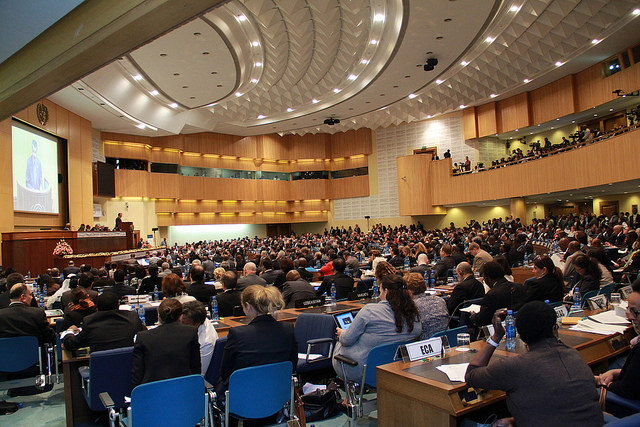
Date: 2024-07-17 Page is: DBtxt003.php txt00010198
Ideas ... John Buckley
Big role for money
What Will It Take to Finance the U.N. Sustainable Development Goals?
Burgess COMMENTARY
Peter Burgess
What Will It Take to Finance the U.N. Sustainable Development Goals?

It became clear at the recent U.N. Financing for Development Conference in Addis Ababa, Ethiopia, that both public- and private-sector involvement will be needed to finance the forthcoming U.N. Sustainable Development Goals.
It became clear at the recent U.N. Financing for Development Conference in Addis Ababa, Ethiopia, that both public- and private-sector involvement will be needed to finance the forthcoming U.N. Sustainable Development Goals.
Sustainable development is at a critical milestone. As the United Nations moves toward ratifying the Sustainable Development Goals (SDGs) in September – 17 overarching goals that will replace the Millennium Development Goals and set the global stage for development from 2016 to 2030 – where will the funding needed come from?
As complex global environmental, social and governance (ESG) issues become increasingly interconnected and affect societies of developed and emerging markets alike, the SDGs present a key opportunity to accelerate progress and improve the lives of billions around the world. The need and the importance are not lost on the private sector.
In fact, as I heard at the recent U.N. Financing for Development (FfD) Conference in Addis Ababa, Ethiopia, access to capital remains a significant constraint on business and entrepreneurs operating in developing markets, which are often considered higher risk environments for investors. Many of the conversations at FfD focused on a broadening role for the private sector and investors in development finance. From my company’s vantage point – more than 20 percent of the world’s financial assets flow through BNY Mellon on any given day* – we can see that traditional sources of funding from the public sector and philanthropic institutions are insufficient. Investor capital can fuel development if the enabling environment is in place.
We are focused on the role that mainstream investors can play in financing sustainable development through investments that generate financial returns and include positive social and environmental impact, which we call social finance. We estimate that the social finance market today stands at $22 trillion – and it hasn’t yet reached its full potential.
As a global investments company that works with investors from pension funds to high net worth individuals, we believe social finance should offer investors an opportunity to protect and grow their financial assets in the face of a shifting global landscape, as well as to support solutions to some of the world’s toughest problems.
To translate emerging investor interest in social finance into meaningful capital allocation, the current challenges and barriers to bringing social finance to scale need to be addressed. Our research shows that five categories of action can address these challenges if investors, intermediaries and other actors work together:
1. Accessibility: To align expectations to create attractive investment products, proposed actions include:
Facilitating asset allocation with multiple social finance products which meet different risk tolerances, return expectations and liquidity requirements
Creating products with well-defined return expectations and clear impact objectives
Deepening social finance expertise and knowledge in investment teams and among client advisors
2. Measurement: To build track records, frameworks and the presentation standards necessary to generate investor confidence, proposed actions include:
Developing and adopting standardized nonfinancial metrics
Integrating social and environmental impact into valuation and risk measurement
3. Transparency: To institutionalize information-sharing among investors and stakeholders as best practices to promote the efficient use of capital, proposed actions include:
Driving consistent and material disclosure of social and environmental impacts on financial performance, as well as the effect on stakeholders Increasing awareness and promote learning by sharing best practices regarding the integration of social finance into portfolios
4. Systemic change: To create incentives that shift thinking about value creation and support good governance and positive policy frameworks, proposed actions include:
Working towards acceptance of assessment of ESG risks and opportunities as part of fiduciary duty
Working towards alignment of internal and external incentives with long-term value
Encouraging good governance and positive policy that can respond to and support broader uptake of social finance
5. Collaboration: To pursue innovation and risk mitigation by leveraging expertise through partnerships, proposed actions include:
Encouraging partnership among stakeholders and product innovation to control ESG risk in asset portfolios
Providing guidance and technical assistance provided to issuers in order to strengthen the pipeline of investable social finance-oriented securities
As our recent whitepaper, Social Finance at Scale: Creating Value for Investors, demonstrates, these barriers are significant but not insurmountable. We believe that a collaborative, cross-sector effort – comprised of policymakers, intermediaries and issuers – can address and solve the challenges that hinder investor participation in social finance and ultimately enable the environment for investor capital to advance the field.
Our pursuit of sustainable development will only succeed when we pair intent with action. The urgency has never been clearer as my recent trip to FfD confirmed. As one of the world’s leading investments companies, we recognize the role we can play in leveraging our market infrastructure and investment expertise to advance positive change.
To learn more or connect with us, please feel free to drop us a note at csr@bnymellon.com.
*Based upon the value of assets held in custody reported by the top 51 custodians, as reported by Global Custody.net in March 2014.
Image credit: Flickr/Third International Conference on Financing for Development
John Buckley is Global Head of Corporate Social Responsibility for BNY Mellon.
3p Contributor TriplePundit's guest author program has had over 1000 contributors over time. If you'd like to be a guest author, please get in touch! FOLLOW 3P CONTRIBUTOR @TRIPLEPUNDIT
| BNY Mellon |
|
BNYMellon-social-finance-at-scale-2015
A BNY Mellon White Paper on impact investing at scale 'http://www.truevaluemetrics.org/DBpdfs/ImpactInvesting/BNYMellon-social-finance-at-scale-2015.pdf' | Open PDF ... BNYMellon-social-finance-at-scale-2015 |